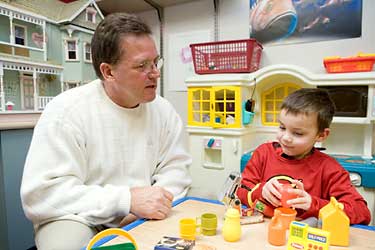On the sixth floor of C.S.Mott Children’s Hospital there is a room where injured, ill and traumatized children can escape their afflictions. A dress-up castle, a play kitchen, a pool table, an air hockey table, video games, a leather couch, computers and a myriad of board games are available for children in the Activity Center, a medical-free zone open daily from 9 a.m.-7 p.m.

A line usually forms outside the door in the morning as the children wait their turn to enter this magical place.
Jerry Reed, an activity therapist who has been with the University since 1975, is doing his part to ensure that children have an escape from ailments by providing therapy through art, music and play. “I like to facilitate making things better in a meaningful way,” Reed says. “It’s all about helping patients and families. And that’s what our role is here.”
“I want to make a difference,” Reed adds. “You want to make the children feel better and somehow you feel better in the process. It is about helping other people get to where they need to be.”
The center provides a place where children can interact with peers and forget about the hospitalization, Reed says. It is not uncommon to see Reed play with Barbie dolls or the play kitchen that sits in a corner. “I’ll tell them, ‘You just burned my tongue!'” Reed says as he samples their “cooking.” Just like a big kid.
Reed applauds his co-workers for establishing scrap booking as a form of art therapy. “It sort of puts them in a relaxed atmosphere,” he says. The children are given cameras and allowed to take photographs with their doctors, therapists and other people or objects they deem important. Reed says scrap booking also gets parents involved.
Holidays are festive occasions in the center and the children create crafts and decorate the room for all events. The therapists work with community groups who provide pizza parties and magic shows. The children also enjoy visiting with U-M athletes who spend time with them on Thursday evenings. They also benefit from the weekly Therapet program, when an animal joins them for an afternoon visit to facilitate healing and rehabilitation through animal-assisted therapy.
“Every day is different,” Reed says. “That’s what makes it so exciting to me. No matter how much you’ve planned, you have to be able to switch gears at a moment’s notice.”
When the children cannot come to the activity room due to illness, Reed goes to them with movies, games and a kind word of support.
Another initiative done collaboratively by staff is the Hope Bead program, which gives children a way to visually express their hospital stays. For each aspect of care, a child receives a colored bead; an olive green wooden bead represents a biopsy while surgery grants a rainbow bead. The beads are threaded onto a bracelet that has each child’s name on it. The children share their stories with friends, he says.
Reed says it can be difficult to stay positive when he sees the heartache and hurt at times, but he’s learned a trick during the years. “You just have to realize how blessed you are,” Reed says. “You realize just how menial so much stuff in our life is, how much baggage we carry. It’s important for these people to be kids, to have a normal environment.”
Reed says he’s had many rewarding life experiences thanks to the children he works with each day. “I am supposed to make a change in their life; however, I have found that they make changes in mine,” he adds. “They’ve made me a better person.”

